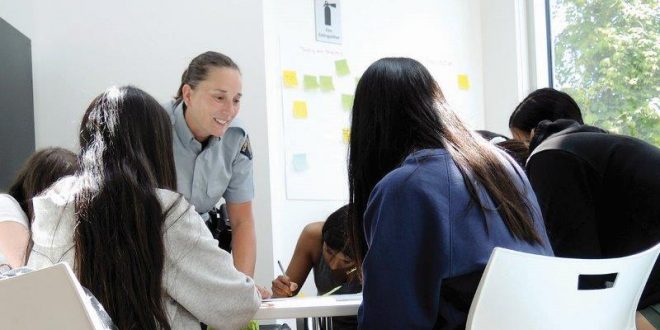By Surbhi Gogia
The Surrey RCMP has recently launched “Project Lavender”, a program that aims to empower young women and girls to make positive choices and surround themselves with healthy relationships. The prevalence of social media and cell phones has made it easier to impeach on your privacy. The youth is an easy target group since it is the age when young people want to ‘fit in’ and give in to the peer pressure. Asking for personal photos, or responding to ‘sexting’ is one big concern that has made many young girls victim. Once they fall into the trap, it is hard to come out of this vicious circle. Project Lavender is born out of some of these concerns pointed by young women. It is the initiative built in collaboration with female students from across the Surrey School District. The content of the program focuses on topics identified by young women and girls who participated in the collaborative development process. Project Lavender, will tackle topics which include texting; ‘sexting’; understanding sexual exploitation; drug and alcohol awareness; and the importance of healthy relationships. In an interview with Desi Today, Inspector Wendy Mehat, Community Support, and Safety Officer, talks in detail about the project and offers tips on saving yourself from a situation that can rock your world.
What was the idea behind launching Project Lavender?

Project Lavender is a program which aims to empower young people, young women in particular, providing tools and strategies to deal with challenges they may be facing. We wanted to create a program which focuses on the actual concerns of the young women we are trying to reach in our community. So, a very big part of the creation of Project Lavender was working with youth across the Surrey School district who provided their insight into issues that mattered most to them. They came up with topics ranging from sexting and exploitation, to addictions and healthy relationships.
Who are your target audience and how do you plan to take it to them?
Project Lavender was developed to be an in-school presentation. The presentation is geared towards students in Grades 5-10, and primarily intended for young women and girls, but the information is relevant to everyone. Our Surrey RCMP School Resource Officers facilitate the program, and we have engaged women in the community who share their personal experiences, through a series of videos, and presentations.
What are some of the methods you would be using under this project to spread intended information?
Project Lavender is a one-hour interactive presentation, during which role models from the community share their personal experiences. These personal experiences engage the audience, who we hope will find some relatable truth that they recognize from their own experiences. The presenters are able to then connect with the audience and instill tools needed for resiliency and for making smart choices.
There are a lot of programs running in schools about empowering young women, what makes Project Lavender different?
One of the things which makes Project Lavender is unique is that it was created with input of youth within Surrey high schools. The youth that we are aiming to empower. We wanted to ensure that we would be able to provide support to young women in areas they feel they could use it the most. The information that youth from our Surrey School District brought forward helped shape this project.
Texting, sexual exploitation, and sexting are some of the major issues you have identified to address under this project and why do you think it is important to address them? Do you think a lot of women are getting trapped in sexting? Was RCMP receiving a lot of calls?
With the prevalence of cell phones and social media, we have seen some increases in requests made to students by their peers for personal photographs.
Surrey RCMP School Resource Officers have helped young people who have becoming victims of bullying and blackmail as a result of sexting. Our aim with Project Lavender is to educate young people before they encounter a ‘sexting’ request, to build resiliency and to give youth the tools they need to make good decisions. So, when our young people come across these issues, they have what they need within them to stay safe.
Do you think the problem of dealing with such situations becomes intense when it comes to South Asian girls, since South Asian families have limited conversations about these topics? What has been your experience while talking to South Asian girls about such situations?
While Project Lavender is geared to all youth regardless of their background, we know cultural differences exist in homes across our city. With regards to South Asian community specifically, we heard directly from South Asian female students that there can be challenges with parent communications and their understanding of some of these issues that Project Lavender addresses. As a result, we felt it was important to include a South Asian female mentor from the community in our program as a guest speaker to speak of her experiences to youth. In addition, we also feature South Asian female police officers as presenters for Project Lavender to address some of those cultural differences.
You’ve also hit on a key point in your question, communication with your kids is a big part of keeping them safe and supported. We have resources that can help parents talk to their kids, some of those can be found on our Surrey RCMP website.
A lot of young women become intimidated with the situation if they are asked to send personal photos? How do you think they can approach this situation?
Never underestimate your self-worth. You don’t owe a photo to anyone, not a boyfriend, not a friend, or partner. It can be very difficult to refuse someone who is pressuring you, but if a person takes advantage of your intimate photo, you can be placed in a much more difficult situation down the road. Within our presentation we provide specific tips and tools to address sending photos of a personal nature.
If there is someone who gets trapped into any such embarrassing situations, what is the advice you have for them?
Talk to someone you trust and report what has happened to the police. Sharing a problem and asking for help is a brave and positive first step. There is no situation too embarrassing to seek the support of trusted adults in your life.
 Desi Today Magazine
Desi Today Magazine




